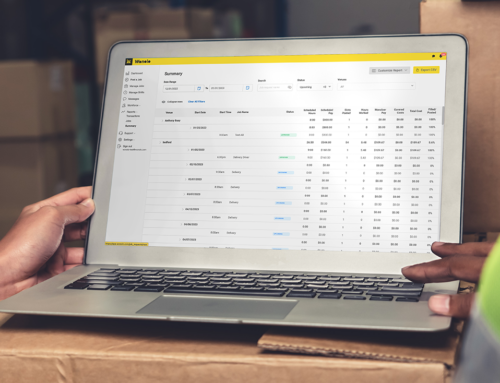Wonolo
 Stuck on a plane without wifi, I had the opportunity to catch up on a bunch of articles that I had been saving to read. Two articles of the dozen or so stuck with me – the first an HBR write up on the age of hyperspecialization and how this concept is changing the way work gets done – cutting up work into tasks and outsourcing it (Wonolo falls into this bucket). The second by Dave McClure on how tech is going to kill all the old school public (as he refers to them, dinosaur) companies. The Harvard article articulates how the future of work is changing, the McClure rant points to the potential implications – that those who don’t or can’t adapt will go extinct.
Stuck on a plane without wifi, I had the opportunity to catch up on a bunch of articles that I had been saving to read. Two articles of the dozen or so stuck with me – the first an HBR write up on the age of hyperspecialization and how this concept is changing the way work gets done – cutting up work into tasks and outsourcing it (Wonolo falls into this bucket). The second by Dave McClure on how tech is going to kill all the old school public (as he refers to them, dinosaur) companies. The Harvard article articulates how the future of work is changing, the McClure rant points to the potential implications – that those who don’t or can’t adapt will go extinct.
This stuck with me because I am on a flight back from spending two days with a Fortune 500 that is implementing Wonolo to insure they always have the right talent for the right job, through technology which makes it as simple ‘hailing’ an Uber ride. We have talked and worked with many large Enterprises, some more innovative than others, but this one totally got it. They know they are perceived as a ‘dinosaur’ and the day of reckoning is coming if they don’t adapt and evolve. And they are. And I was thoroughly impressed.
We are focused on shaping a piece of what we see as the Future of Work here at Wonolo. But that vision of the future, a more flexible way for companies and Wonoloers to get work done, is only achieved if we help these dinosaur companies survive the apocalypse (the rush of startup disrupters) by acting more like the crocodiles that survived than the Cryolophosaurus that did not. (Did you know that the crocodile lived with the dinosaurs, shares the same ancestors, and is over 200 million years old?)
It’s quite interesting actually – no one knows why exactly the crocodile survived but the dinosaur did not. There are few theories though from which we can learn as we try to protect these dinosaur companies from a similar fate and I’ll use today’s company, which we’ll call code name Pluribus, as an example of how they are positioned to be like the crocodile and thrive while those dinosaurs around them fall.
Crocodiles are cold-blooded. No, not cold-blooded as in killers (although they can be), but cold-blooded as in can survive in tough and changing conditions. Contrast that with us warm-blooded creatures (including dinosaurs it is believed) who need heat and food – energy – on a constant basis. This means crocodiles adapt to their changing surroundings – in good times and bad. When the big meteor hit which wiped out the dinosaurs as it took their light, heat, food, etc – the crocodile could wait it out while others panicked and perished. They kept calm and carried on because they knew – they’d just get fat eating up all the dead dinosaur meat.
How many dinosaur companies do we see panicking and perishing right now. Too late to change, scurrying around futilely trying to save themselves? The taxi industry, the cable industry, the music industry. Dead dinosaurs. Unlikely that any individual players will survive. We all know the video rental industry is gone – disrupted years ago. However, inside that industry, there was Blockbuster the dinosaur, and Netflix the crocodile. Remember, Netflix used to be a DVD rental company just like Blockbuster. The ghost of Blockbuster scurried to a streaming service eventually – Blockbuster On Demand – but they were already extinct. Netflix made that transition early and adapted to broadband and the changing landscape. Look where they are now. Our friends at Pluribus are part of an industry that is on the brink of disruption as well. The writing is on the wall. But they are adapting through innovation and acting cold-blooded preparing to prosper while others around them fall.
Crocodiles are smarter than dinosaurs. Most dinosaurs are known to have a horrible brain volume to body mass ratio. They were stupid. Many relied on brute force or size intimidation to fend off predators, but if a smarter, more agile species figured out its weakness, they were defenseless against them. Crocodiles on the other hand are fierce predators, and while myths about their speed are highly exaggerated, they possess lightning-fast reactions and move quickly when they make up their mind. Because they know their limitations, they make an attack when they have a high probability of success. They even invented ‘crocodile tears‘ – the art of luring your victims with fake tears and then snapping them up and devouring them.
If you have ever worked in a dinosaur company, you probably feel that side effects of big body, small brain dilemma daily. The brain-doesn’t-know-what-the-body-is-doing syndrome – as in management is out of touch with the rest of the company. Or the rest of the world for that matter. So overcome with protecting what it already has rather than foraging for more. It can’t think beyond the short term and often can’t control its own body. It was even thought for a long time that real dinosaurs had two brains – which turned out to be false. On the other hand, faltering dinosaur companies often grow multiple brains and spin out of control. Crocodile companies meanwhile are too big to sprint with exponential growth, but when they want something, they are smart enough to know how to get it. They make decisive, calculated moves to feed themselves and make short term sacrifice to grow bigger and stronger long term.
Mondelez and P&G are acting like crocodiles – making smart moves by cutting up and unloading part of their business to focus on the growth potentials. P&G chief says, “This will enable P&G people to be more agile and responsive. More flexible and faster. Less will be much more.” Pepsi the dinosaur on the other hand, despite numerous calls for a Pepsi – Frito Lay breakup, refuses to get smart and in typical dinosaur-like fashion, wants to keep hold of everything it has accumulated and tell itself things will get better. Pluribus has a razor sharp focus on being #1 in the products they sell – it’s more important to be the best than to be the biggest and they have unloaded huge portions of their business which weren’t the future. And they are taking giant steps in all parts of their operations to insure they move quickly to ride with change and take advantage of those that can’t.
Companies win or lose based on their staff. The people and they way they use them. The future of work does not look like it did 20 years ago or even as it looks today. Work will be flexible, fluid, and more unpredictable – the type of environment to which a crocodile can adapt and thrive but a dinosaur will struggle and succumb.
It’s an exciting time to watch the battle of the crocodiles and the dinosaurs from the sidelines, but even more exciting to be there live to see how crocodiles like Pluribus keep on keeping on. While Dave McClure may be right in his article that the “dinosaurs gonna die,” he overlooked the crocodiles that will acclimate and prosper. We are honored to be helping out those crocodiles and wish the dinosaurs luck as their next colossal meteor approaches.






